New research from Leora Eisenstadt, assistant professor of legal studies, examines how companies are using data analytics to track employee behavior and habits.
PHILADELPHIA, Feb. 17, 2020—Work-life balance is key to cultivating a healthy work environment, but attaining it is not easy. In fact, new research from Leora Eisenstadt, assistant professor of legal studies at Temple University’s Fox School of Business, suggests that the line between our personal and professional lives have never been more blurred.
Recently published in the American Business Law Journal, “Data Analytics and the Erosion of the Work/Nonwork Divide” examines how companies are using data analytics to monitor employee behavior. Employers taking an interest in their employees’ personal lives is nothing new. For example, the increasing cost of healthcare has led some employers to inquire into employees’ off-duty smoking and drinking habits in recent years.
However, what many companies are doing now is a bit more complicated than that.
“Employers have begun to monitor and track employees’ off-duty hobbies, consumer preferences, health concerns, exercise and sleep regimens, and family planning thoughts,” Eisenstadt says. “These new reaches into employees’ personal lives are then used to make workplace decisions, largely eliminating the distinction between work and non-work spheres.”
In her research, Eisenstadt takes a closer look at several software data-mining efforts, including Project Comet, Castlight Health, facial recognition in lieu of employee ID cards and others.
Arguably the most far-reaching project that Eisenstadt analyzed is Project Comet, a program that mines data from employees’ social media accounts and then analyzes the information for use by the employer. Primarily used by a major U.S. healthcare company, Project Comet was first created as a tool that could be used to build better employee teams. However, as Eisenstadt outlines in her piece, it may soon have other uses.
“The program can analyze social media data to determine the best seating arrangements for employees. It may be used to determine which employees possess leadership capabilities and should be given additional training or professional development opportunities. And, eventually, the program may assist managers in selecting candidates for downsizing or for promotions,” Eisenstadt writes.
Data analytics, fueled by off-duty data on employee’s personal lives, could soon be the driving force behind hiring and firing decisions. This is a stark difference from traditional human resource management practices.
Eisenstadt says some of the implications behind Castlight Health’s data mining could be equally as dangerous. The company is a third-party entity that provides services to employers, including the ability to track healthcare spending and search for in-network doctors. Walmart and Time Warner are both among Castlight Health’s clients, meaning the company potentially has access to data on millions of employees.
Through Internet searches, physician specialist searches and requests, and changes to prescription purchases, Castlight can identify which employees are contemplating becoming pregnant, are concerned about developing diabetes or believe they may need back surgery in the near future. This information is likely not protected by HIPAA either, as that applies only to “covered entities,” which include healthcare providers, health plans, employers and healthcare clearinghouses.
With Castlight, companies and organizations could easily make decisions based on an employee’s health, making that line between personal and professional lives even blurrier. That’s why Eisenstadt suggests companies should think twice prior to using data analytics like this.
The blurring of the line between work and non-work spheres has significant negative implications both for employees’ health and well-being as well as the potential legal liability of employers. Numerous laws depend upon a dividing line between work and personal domains, and the erosion of that line has the potential to do damage to both parties to the employment relationship.
“When employers can track employees’ heart rate and sleep quality, determine who is contemplating pregnancy, identify an employee’s emotional state from a facial scan, and use all of this information to make workplace decisions, there is no real division between what is work and what is not,” Eisenstadt says. “As a society, we must decide whether the divide between work and nonwork spheres is a societal good that should be protected and to what extent. Regardless of where Americans come down on this question, we should be actively choosing a course rather than mindlessly submitting to the technology’s appeal. Or, to state it plainly, just because we can does not mean we should.”
About the Fox School of Business
The vision of Temple University’s Fox School of Business is to transform student lives, develop leaders and impact our local and global communities through excellence and innovation in education and research.
The Fox School’s research institutes and centers and 200+ full-time faculty provide access to market-leading technologies and foster a collaborative and creative learning environment that offers more than curriculum—it offers an experience. Coupled with its leading student services, the Fox School ensures that its graduates are fully prepared to enter the job market.
The school’s knowledge-creating research faculty affords it the flexibility and responsiveness to address the needs of industry and generate courses and programs in emerging fields of study. As a leader in business research, the Fox School values interdisciplinary approaches and translational research that advance actionable insights to solve real-world problems. Our research informs an adaptive curriculum, supports innovation in teaching and prepares students for the changing nature of work.

